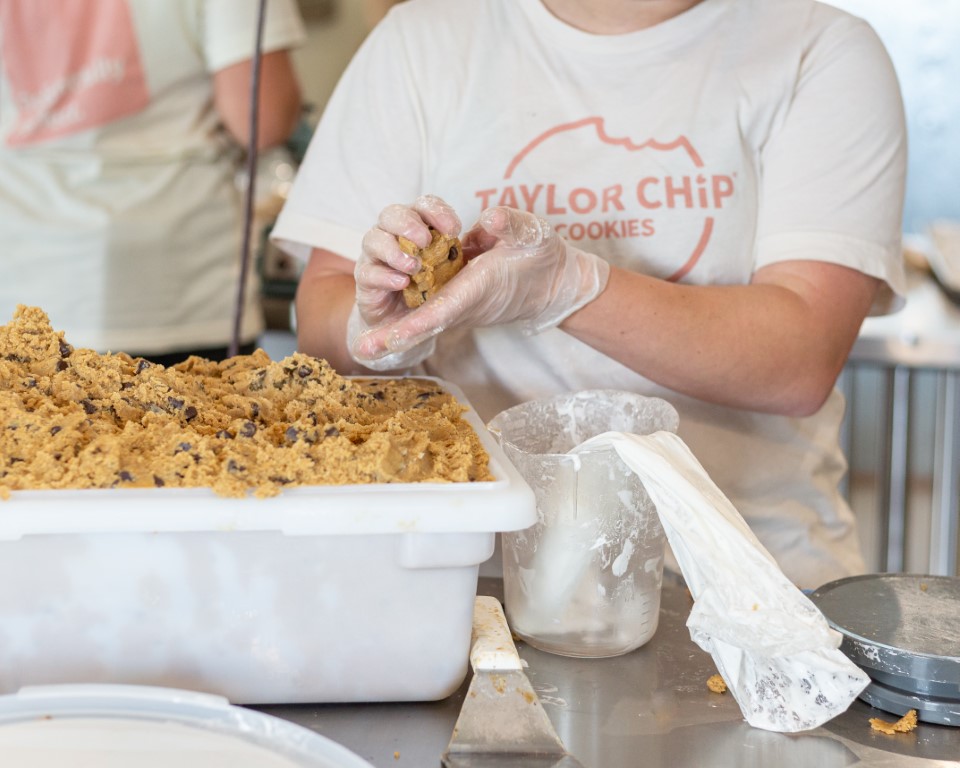So, you may be wondering if you can freeze baked cookies to maintain their freshness and enjoy them later. Short answer is yes. Make sure they're completely cooled before storing them in airtight containers or freezer bags to prevent freezer burn. Freezing works well for most cookies, especially soft varieties like chocolate chip and oatmeal, but keep in mind that crisp cookies may lose some crunchiness. To thaw, leave them at room temperature for about 30 minutes or reheat briefly in an oven preheated to 300°F (150°C). This method reduces waste and allows you to have homemade treats readily available, guaranteeing peak taste and texture when you're ready to enjoy them.
Key Takeaways
- Yes, freezing baked cookies preserves their freshness and extends their shelf life.
- Cool cookies completely before freezing to retain optimal texture and moisture.
- Store cookies in airtight containers or freezer-safe zip-top bags to prevent freezer burn.
- Most cookies freeze well, but high moisture content cookies may not retain quality.
- Thaw cookies at room temperature or reheat briefly in the oven to restore their original texture.
Understanding Cookie Composition
To understand how freezing affects baked cookies, you need to know about their composition, starting with key ingredients like flour, sugar, and fats, which define texture and taste. These ingredients play specific roles, such as binding, sweetening, and creating the desired crumb. Additionally, nutritional enhancements and flavor innovations, like adding oats or spices, can alter the way cookies react to freezing and thawing, impacting their overall quality.
Key Ingredients and Their Roles
Understanding the key ingredients in cookies and their roles is vital to mastering the perfect bake. The primary ingredients in cookie dough—flour, sugar, butter, eggs, and leavening agents—each play a significant role. Flour provides structure, while sugar adds sweetness and helps with browning. Butter contributes to both flavor and texture, creating a rich, tender bite. Eggs act as a binder, holding the ingredients together, and leavening agents like baking soda or powder guarantee your cookies rise properly.
When freezing baked cookies, the moisture content is essential. High moisture content can lead to soggy cookies once thawed, so verify your cookies are fully baked and cooled before freezing. Wrap individual cookies in plastic wrap and place them in freezer bags to maintain their texture and flavor. Frozen cookies can last for several months if stored correctly.
For cookie dough, you can freeze portions of dough by scooping individual cookies onto a baking sheet, freezing until solid, and then transferring to freezer bags. This method helps you bake fresh cookies on demand. Understanding these ingredients and their roles will help you achieve consistent results, whether baking fresh or freezing for later.
Nutritional Enhancements and Flavor Innovations
Improving the nutritional profile of your cookies doesn't mean sacrificing flavor. By making thoughtful substitutions, you can create a delicious treat that's also healthier. For instance, replace white flour with whole wheat or almond flour to increase fiber content. Swap out refined sugars for natural sweeteners like honey or maple syrup, which offer trace nutrients. These nutritional improvements can greatly enhance the overall health benefits of your cookies.
Don't forget about flavor innovations. Adding spices like cinnamon or nutmeg, or incorporating ingredients such as dark chocolate, nuts, and dried fruits, can raise your cookies to a new level. These additions not only enhance flavor but also contribute antioxidants, healthy fats, and vitamins. Experiment with different types of cookie dough, such as oatmeal or chickpea-based dough, to find the perfect balance of taste and nutrition.
When freezing baked cookies, these enhancements and innovations maintain their integrity, ensuring that your frozen treats are just as delicious and nutritious as when they were fresh. By carefully selecting ingredients and trying new combinations, you can enjoy a variety of cookie flavors that satisfy your taste buds and support a healthier lifestyle.

Choose Your Own Delightfully Perfect Cookies.
With almost 30 flavors to choose from, you can make your box as unique as you are.
The Freezing Process
When freezing baked cookies, you'll need to take into account how the process affects their structure, ensuring they maintain quality. Follow best practices like cooling cookies completely before freezing and using airtight containers or freezer bags to prevent freezer burn. Practical tips include labeling with the date and type of cookie, and knowing the recommended storage duration to enjoy them at their best.
Effects on Cookie Structure
During the freezing process, baked cookies undergo several changes that can impact their structure. When you freeze baked cookies, the water content in them turns into ice crystals. This can cause the cookies to become slightly drier once thawed. Delicate cookies, such as those made from frozen cookie dough, are especially prone to structural changes. The freezing process can make these cookies more brittle and crumbly, potentially affecting their overall texture.
The way you store baked cookies in the freezer also plays an important role in preserving their structure. It's vital to use a proper freezer container to minimize exposure to air and moisture, which can lead to freezer burn. Using freezer paper to individually wrap each cookie can provide an extra layer of protection, ensuring that your cookies maintain their shape and taste.
Consider these points to understand how freezing impacts cookie structure:
- Dryness: Thawed cookies may be less moist.
- Brittleness: Delicate cookies can become more fragile.
- Freezer burn: Improper storage can ruin flavor and texture.
- Shape distortion: Cookies might lose their original shape.
- Crumbly texture: The texture can become less cohesive.
Using a baking sheet to initially freeze cookies before transferring them to a freezer container helps maintain their structure.
Best Practices and Practical Tips
To guarantee your baked cookies stay delicious and maintain their structure during freezing, follow a few best practices and practical tips. First, allow your baked cookies to cool completely before starting the freezing process. Warm cookies can create condensation, leading to a soggy texture once thawed.
Next, arrange your cookies in a single layer on a baking sheet lined with parchment paper. This prevents them from sticking together during the initial freezing phase. Place the baking sheet in the freezer for storage until the cookies are firm, usually taking about an hour. Once the cookies are frozen solid, you can transfer them to a more permanent storage method.
For long-term storage, wrap each baked cookie individually in plastic wrap to maintain freshness and prevent freezer burn. After wrapping, place the cookies in a freezer-safe bag or an airtight container. Label the container with the date to keep track of storage time.
Types of Cookies Suitable for Freezing
When considering which cookies to freeze, you'll need to think about texture and ingredients. Soft cookies like chocolate chip or oatmeal generally freeze well, while crisp cookies such as gingersnaps might lose their crunch. Additionally, pay attention to ingredients and allergens, as some components, like nuts or dairy, may change in texture or taste after freezing.
Soft vs. Crisp Cookies
Choosing the right type of cookie to freeze can make a notable difference in the quality and texture after thawing. When it comes to soft cookies and crisp cookies, each has its own suitability for the freezer. Soft cookies, such as chocolate chip or chewy oatmeal, usually maintain their moist texture even after being frozen and thawed. Crisp cookies, like gingersnaps or shortbread, can also be frozen but might lose some of their crunchiness upon thawing.
To guarantee the best results for your freezer cookies, follow these tips:
- Wrap cookies tightly: This prevents freezer burn and preserves freshness.
- Use airtight containers: Keeps already-baked cookies in ideal condition.
- Label with baking instructions: Makes it easy to reheat or refresh crisp cookies.
- Separate layers with parchment: Prevents cookies from sticking together.
- Cool completely before freezing: Guarantees cookies maintain their texture.
Soft cookies generally fare better during the freezing process because their inherent moisture helps them stay tender. Crisp cookies, on the other hand, might require a few minutes in the oven after thawing to regain their original crunchiness. By considering the type of cookie, you can enjoy delightful treats even after they've been stored in the freezer.
Ingredient Variations and Allergen Considerations
Understanding ingredient variations and allergen factors is vital when freezing cookies. Different ingredients can affect how well your homemade cookies hold up in the freezer. For instance, cookies with high moisture content, like those with fruit fillings or soft centers, may not freeze as well as drier varieties like shortbread or sugar cookies. Additionally, ingredient variations such as the type of flour or fat used can influence the texture and taste after thawing.
When dealing with frozen cookie dough, it's important to take into account any allergen factors. If you're baking for someone with allergies, make sure you clearly label cookies containing common allergens like nuts, dairy, or gluten. This is especially important if you plan to freeze batches for later use, as it's easy to forget specific ingredients over time.
Different baking methods can also impact the freezing process. For example, cookies baked at higher temperatures for shorter periods might retain their texture better after freezing than those baked at lower temperatures for longer durations. By understanding these factors, you can make informed decisions about which types of cookies are suitable for freezing, guaranteeing they remain delicious and safe for everyone to enjoy.
Thawing and Reheating Frozen Cookies
To guarantee your frozen cookies maintain their delicious taste and texture, you'll need to use specific methods for thawing and reheating. Allow the cookies to thaw at room temperature for best results, which helps preserve their moisture and softness. For enhancing flavor and achieving a freshly-baked feel, consider reheating them briefly in the oven at a low temperature.
Methods for Optimal Results
After freezing your baked cookies, you'll want to guarantee they taste as fresh as possible when you're ready to enjoy them. To achieve ideal results, follow these methods for thawing and reheating your frozen cookies.
First, remove the frozen cookies from the freezer and let them thaw at room temperature. This usually takes about 30 minutes but can vary depending on the cookie size. Once thawed, you can reheat them to regain their freshly-baked texture. Preheat your oven to 300°F (150°C) and place the cookies on a parchment-lined baking sheet. Heat them for 5-10 minutes, checking frequently to avoid overbaking.
To keep your frozen cookies from sticking together, always freeze them in separate layers. You can use a parchment-lined baking sheet for this. Once they're frozen, transfer them to an airtight container. Make sure your cookies are completely cool before freezing to prevent condensation, which can lead to sogginess.
When you follow these steps, you'll enjoy cookies that taste almost as good as the day they were baked.
- Relish the smell of freshly warmed cookies.
- Enjoy cookies with a soft, chewy center.
- Savor the crispy edges of your favorite treats.
- Share delicious cookies with friends and family.
- Indulge in a homemade snack anytime you like.
Enhancing Texture and Flavor
When it comes to enhancing the texture and flavor of thawed and reheated frozen cookies, a few simple steps can make all the difference. First, verify you've used the flash freeze method to freeze your cookies. Arrange them in a single layer on a baking sheet, allowing them to freeze individually before transferring them to a container with parchment paper. This prevents them from sticking together and maintains their shape.
When you're ready to thaw your cookies, do so at room temperature. Avoid exposing them to direct heat or cold temperatures, as this can affect their texture. Once thawed, preheat your oven to 300°F. Place the cookies on a baking sheet lined with parchment paper and reheat them for 5-10 minutes. This brief baking time helps restore their fresh-baked cookies texture and enhances their flavor.
For the best results, store the cookies in an airtight container with parchment paper between each layer. This method preserves their moisture and prevents them from becoming stale. By following these steps, you'll enjoy cookies that taste almost as good as when they first came out of the oven.
Quality Assessment of Frozen Cookies
When you assess the quality of frozen cookies, consider both sensory evaluation and any potential nutritional changes. Freezing can affect the texture, flavor, and aroma of cookies, so you should compare these attributes to freshly baked ones.
Additionally, freezing extends the shelf-life of cookies, but it's important to know how long they maintain their quality in the freezer.
Sensory Evaluation and Nutritional Changes
Evaluating the sensory and nutritional changes in frozen cookies is essential for determining their quality after thawing. When you freeze baked cookies, you need to take into account how well they retain their original taste, texture, and nutritional value. Sensory evaluation involves examining the cookies' appearance, smell, taste, and feel after they've been in freezer storage. You might notice subtle differences in cookie texture, such as increased hardness or dryness, which can affect your enjoyment. Nutritional changes can also occur, though they are often minimal, depending on the ingredients and freezing duration.
Factors impacting frozen cookies include:
- Texture changes: You may find cookies becoming more crumbly or losing their chewiness.
- Flavor retention: Freezing can sometimes dull flavors, making the cookies taste less fresh.
- Moisture loss: Cookies might dry out, leading to a less satisfying bite.
- Nutrient preservation: While most nutrients remain stable, some sensitive vitamins might degrade over time.
- Visual appeal: Frost can form on cookies, altering their appearance.
Shelf-Life Extension
Extending the shelf-life of baked cookies through freezing offers a practical way to preserve their freshness and quality for longer periods. When you store cookies in the freezer, you effectively slow down the processes that lead to staleness and spoilage. To maximize the benefits of freezer storage, confirm your cookies are completely cooled before freezing. Place them in airtight containers or heavy-duty freezer bags to prevent freezer burn and maintain their texture.
Quality assessment of frozen cookies reveals that their shelf-life extension depends on proper cookie storage techniques. Freezing can keep cookies fresh for several months, but you must pay attention to packaging to avoid stale cookies. If you don't seal them well, moisture and air can compromise their quality, leading to a less enjoyable treat when thawed.
When you're ready to enjoy your frozen cookies, let them thaw at room temperature. This method helps maintain their original taste and texture. Alternatively, you can briefly warm them in the oven to restore their fresh-baked feel. By following these steps, you can extend the shelf-life of your baked cookies and enjoy them long after their initial baking.
Innovative Applications
Freezing baked cookies opens up exciting possibilities, such as using them as vehicles for nutraceuticals, which can enhance their health benefits. You can also enjoy the convenience of customizing and storing a variety of flavors and types to suit different dietary needs and preferences. With these innovative uses, frozen cookies can become more than just a simple treat.
Cookies as Nutraceutical Vehicles
As the food industry evolves, cookies are stepping into the spotlight as more than just a tasty treat. Now, they're being used as nutraceutical vehicles, delivering essential nutrients while satisfying your sweet tooth. Imagine biting into a cookie that not only tastes delicious but also supports your health with added vitamins, minerals, and other beneficial compounds.
Whether you prefer frozen cookies or fresh cookies, these enhanced treats can fit seamlessly into your routine. You can make a batch using specific cookie recipes designed for nutraceutical benefits, bake them, and use freezer storage to keep them fresh. This way, you can enjoy healthy cookies whenever you want without compromising on taste or nutrition.
Here are some reasons why nutraceutical cookies might evoke excitement:
- Convenience: Easy to store and ready to eat anytime.
- Health Benefits: Infused with vitamins, minerals, and antioxidants.
- Versatility: Flexible to various dietary needs and preferences.
- Taste: Delicious flavors that don't taste like health food.
- Family-Friendly: A fun way to get kids to consume nutrients.
Customization and Convenience Benefits
Nutraceutical cookies aren't just about health benefits; they offer customization and convenience that modern consumers crave. With frozen cookie dough, you can create personalized, nutrient-rich treats tailored to individual dietary needs and preferences. Whether you're baking for yourself or catering to a crowd, pre-made dough allows you to whip up fresh, baked cookies at a moment's notice, ensuring everyone gets exactly what they want.
Using a cookie freezer, you can store various doughs, making it easy to bake different flavors on demand. This is particularly useful for holiday cookies when variety and quantity are essential. You can prepare multiple batches in advance, then freeze and bake them as needed, minimizing stress during busy seasons.
Moreover, effective cookie storage extends the shelf life of your baked creations, maintaining their taste and texture. Vacuum-sealed bags or airtight containers are great for preserving freshness and preventing freezer burn. By mastering these storage techniques, you'll always have delicious cookies ready for any occasion.
Incorporating frozen cookie dough into your routine not only saves time but also enhances your ability to provide customized, nutritious treats. This convenience is crucial for those with busy lifestyles or specific dietary goals.
Troubleshooting Common Issues
Freezing baked cookies can sometimes lead to changes in texture and flavor, which may leave you wondering what went wrong. To address these issues, it's essential to understand proper freezing and thawing techniques, as well as how different ingredients respond to freezing. We'll explore common problems and offer practical tips to help retain the deliciousness and consistency of your cookies.
Addressing Texture and Flavor Changes
When you freeze baked cookies, it's important to address potential texture and flavor changes to guarantee they taste as fresh as possible. Freezing can sometimes result in a loss of the delicate texture and flavor you love. To avoid this, here are some tips to keep your cookies fresh even after they've been in the freezer:
- Avoid Excess Moisture: Excess moisture is the enemy of frozen cookies. Make sure your cookies are completely cool before freezing and use airtight containers or resealable bags to prevent moisture from getting in.
- Wrap Individually: For cookies with a delicate texture, wrap each one in plastic wrap before placing them in an airtight container. This helps to maintain their original texture.
- Use Frozen Dough: If you're planning to bake cookies later, consider freezing the dough instead of the baked cookies. Frozen dough often retains a fresher taste and better texture once baked.
- Thaw Properly: When you're ready to enjoy your cookies, thaw them at room temperature. Avoid microwaving, as it can make them soggy.
- Label and Date: Always label and date your containers so you can keep track of how long your cookies have been in the freezer.
Environmental and Economic Considerations
Freezing baked cookies can be a smart move for both the environment and your wallet. By storing cookies in the freezer, you reduce food waste, ensuring that none of your delicious treats go stale or end up in the trash. Additionally, freezing in bulk allows you to bake larger batches at once, which can be more energy-efficient than using your oven multiple times.
Energy Efficiency and Food Waste Reduction
Reducing food waste and enhancing energy efficiency are essential for both environmental sustainability and economic savings. By freezing baked cookies, you're taking a step towards these goals. When you plan ahead and freeze cookies, you're ensuring that none go to waste, especially if you make large batches. Instead of letting them go stale, store them properly in the freezer, where they can last for months.
- Less frequent baking reduces energy consumption.
- Lower grocery bills from avoiding unnecessary purchases.
- More time for other activities by baking in large batches.
- Decreased food waste by preserving cookies longer.
- Share joy by always having cookies to gift.
Freezing cookies also helps you manage your food storage efficiently. You can prepare frozen dough balls ahead of time, so you only bake what you need. This method not only saves energy but also keeps your freezer organized. Additionally, maintaining a well-stocked freezer means you're less likely to make impulsive trips to the store, saving both time and resources. By adopting these practices, you're contributing to a more sustainable lifestyle and making a positive impact on your wallet and the planet.
Why Trust Our Cookie Crafting Insights?
At Taylor Chip, our journey in the world of cookie crafting began as a labor of love. Sara and Dougie Taylor, the founders of our company, started their baking adventure in 2015 as a fun date night activity. What began as a shared passion for sweets quickly evolved into a dedicated pursuit of the perfect cookie. Over the course of a year, they honed their skills, experimenting with various ingredients, techniques, and recipes.
This hands-on experience has given us a deep understanding of the intricacies of cookie baking, from the science behind ingredient interactions to the art of achieving the ideal texture and flavor. Our expertise extends to all aspects of cookie creation, including the freezing and storage techniques discussed in this article. We've spent countless hours perfecting not just the baking process, but also methods for preserving the quality of our cookies, ensuring that every bite is as delicious as possible, whether freshly baked or carefully stored.
By sharing our knowledge and insights, we aim to help you achieve the same level of cookie perfection in your own kitchen. Whether you're looking to master the art of freezing cookies for later enjoyment or simply want to understand the science behind cookie composition, you can trust that our advice comes from years of dedicated practice and a genuine passion for creating the best cookies possible.
Frequently Asked Questions
Can You Freeze Cookies With Icing or Decorations?
You can freeze cookies with icing or decorations. Just make sure they're completely set and hardened before freezing. Place them in a single layer on a baking sheet first, then transfer to an airtight container or freezer bag.
Do Frozen Cookies Taste Different From Fresh Ones?
You might notice a slight difference in taste between frozen and fresh cookies. Freezing can sometimes affect the texture and flavor, but if you store them properly, they'll still taste delicious once thawed.
How Long Can You Store Cookies in the Freezer?
You can store cookies in the freezer for up to three months. Make sure you use an airtight container or freezer bags. Properly stored, they'll retain their flavor and texture, making them taste almost as good as fresh ones.
Can You Freeze Cookie Dough Instead of Baked Cookies?
Yes, you can freeze cookie dough instead of baked cookies. Just portion it out, place on a baking sheet, freeze until solid, and then transfer to a freezer bag. You'll have fresh cookies anytime you want!
What Packaging Materials Are Best for Freezing Cookies?
You should use airtight containers or heavy-duty freezer bags to freeze cookies. Wrap each cookie in plastic wrap or aluminum foil first. Don't forget to label and date the packages to keep track of freshness.
Conclusion
Freezing baked cookies is a practical method to extend their shelf life. By understanding cookie composition and following proper freezing, thawing, and reheating processes, you can maintain their quality and freshness. Various cookie types are suitable for freezing, and with careful storage, you can avoid common issues. Remember to take into account environmental and economic impacts to make informed decisions. Ultimately, frozen cookies offer convenience without compromising taste or texture, ensuring you always have a delicious treat on hand.










